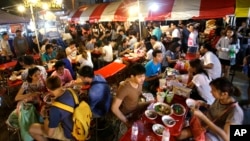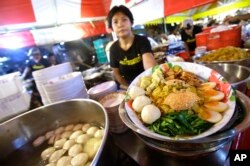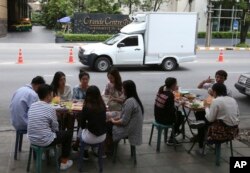Bangkok, Thailand, is known for having some of the best street food in the world. But officials have announced plans to ban food vendors in an effort to clean up the city.
An assistant to Bangkok’s governor told The Nation newspaper the move is meant to improve the appearance, walkability and safety of city streets.
“The street vendors have seized the pavement space for too long and we already provide them space to sell food and other products legally in the market,” the assistant said. “So there will be no let-up in this operation - every street vendor will have to move out.”
Bangkok was recently named the world’s finest street food location for the second year by Cable News Network (CNN).
Forbes magazine also rated Bangkok number one for its street food. The lifestyle website Thrillist placed it second, behind Singapore.
Even the Tourism Authority of Thailand put out a video in 2015 that advertised Bangkok’s famous street food.
CNN said it is “impossible to avoid street food in Bangkok.” It noted that vendors across the city change locations throughout the day to serve as many people as possible.
Vendors can be found in all of Bangkok’s busiest areas. They serve everyone from business people to tourists to local citizens. The chairs and tables are basic. Customers have to deal with Bangkok’s extreme heat and polluted air while they eat. But the tasty food keeps people coming back again and again.
Nont Nontskiul is a financial worker in Bangkok. He lives in a part of the city where street vendors will be some of the first to be removed. He told the Associated Press that, "even people who eat at pricey restaurants every day can't avoid street food. It's faster, tastes better, and costs less than half the price."
Observers say local officials in Thailand have been strengthened by the military government that has ruled the country since a 2014 coup. It launched a campaign to “clean up society.” Efforts have included crackdowns on corrupt politicians, drugs and gambling.
Critics of the street food clean-up campaign say low-income people – including food vendors and their customers -- will be most affected by the ban. They have called on the government to do more to help the vendors keep their businesses going in a legal way.
Ubolwattana Mingkwan is a coffee vendor in Bangkok. She charges 85 cents for a cup of coffee. She says she cannot afford the cost of rent required to do business in a government-approved area.
"I've asked city officials for help and understanding," she told the Associated Press. "All they say now is 'no, no, no.' They've already received their orders."
An opinion article in the Bangkok Post said the ban will hurt working-class people.
The writer of the article wrote, “While many seem worried that Bangkok ‘charm’ will be wiped from the tourism map, I’m more worried about the disappearance of affordable food choices for average men and women, especially low-income earners.”
I’m Jonathan Evans.
Bryan Lynn adapted this story for VOA Learning English based on material from the Associated Press, Reuters, The Nation and Bangkok Post newspapers. Ashley Thompson was the editor.
Where have you experienced the best street food in the world? Write to us in the Comments section, and visit our Facebook page.
________________________________________________________________
Words in This Story
vendor – n. person who sells something outside
walkability – adj. how easy something is for a person to walk through
pavement – n. the hard surface of a road
basic – adj. not including anything special or extra
crackdown – n. attempt to stop activities or punish people for doing something that is now allowed
gambling – n. to risk money while taking part in a game, race or competition
income – n. money a person earns from working
charm – n. a quality that makes something very likeable or attractive
affordable – adj. something with a price most people can pay










